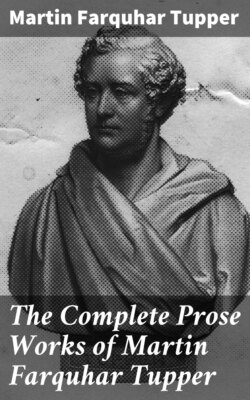Читать книгу The Complete Prose Works of Martin Farquhar Tupper - Martin Farquhar Tupper - Страница 31
На сайте Литреса книга снята с продажи.
JONATHAN'S STORE.
ОглавлениеAnd where has Mrs. Acton been all this morning? Off to the Hall, very soon after Grace had got away; and she rung at the side entrance, hard by the kitchen, most fortunately caught Sarah Stack about, and had a good long gossip with her; telling her, open-mouthed, all about Ben Burke having found a shawl of Mrs. Quarles's on the island; and how, it being very rotten, yes, and smelling foul, Ben had been fool enough to burn it; what a pity! how could the shawl have got there? if it only could ha' spoken what it knew! And the bereaved gossips mourned together over secrets undivulged, and their evidence destroyed. As to the crockery, for a miraculous once in life, Mrs. Acton held her tongue about a thing she knew, and said not a syllable concerning it. Roger would be mad to lose the money. Just at parting with her friend Mary Acton was going out by the wrong door, through the hall, but luckily did no more than turn the handle; or she never could have escaped bouncing in upon the lovers' interview, and thereby occasioning a chaos of confusion. For, be it whispered, the step-dame was not a little jealous of her ready-made daughter's beauty, persisted in calling her a child, and treated her any thing but kindly and sisterly, as her full-formed woman's loveliness might properly have looked for. Only imagine, if the Hecate had but seen Jonathan's lit-up looks, or Grace's down-cast blushes; for it really slipped my observation to record that there were blushes, and probably some cause for them when the keep-sake was given and accepted; only conceive if the step-mother had heard Jonathan's afterward soliloquy, when he was watching pretty Grace as she tripped away—and how much he seemed to think of her eyes and eye-lashes! I am reasonably fearful, had she heard and seen all this—Poll Acton's nails might have possibly drawn blood from the cheeks of Jonathan Floyd. As it was, the little god of love kindly warded from his votaries the coming of so crabbed an antagonist.
Grace has now reached home again, blessing her overruling stars to have escaped notice so entirely both in going and returning; for the mother was hard at washing near the well, having got in half an hour before, and father has not yet left off digging in his garden. So she crept up stairs quietly, put away her Sunday best, and is just dropping on her knees beside her truckle-bed, to speak of all her sorrows to her Heavenly friend, and to thank him for the kindness He had raised her in an earthly one. She then, with no small trepidation, took out of her tucker, just below those withered snow-drops, the crumpled bit of paper that held Jonathan's parting gift. It was surprising how her tucker heaved; she could hardly get at the parcel. She wanted to look at that half-crown; not that she feared it was a bad one, or was curious about coins, or felt any pleasure in possessing such a sum: but there was such a don't-know-what connected with that new half-crown, which made her long to look at it; so she opened the paper—and found its golden fellows! O noble heart! O kind, generous, unselfish—yes, beloved Jonathan! But what is she to do with the sovereigns? Keep them? No, she cannot keep them, however precious in her sight as proofs of deep affection; but she will call as soon as possible, and give them back, and insist upon his taking them, and keeping them too—for her, if no otherwise. And the dear innocent girl was little aware herself how glad she felt of the excuse to call so soon again at Hurstley.
Meantime, for safety, she put the money in her Bible.
What hallowed gold was that? Gained by honest industry, saved by youthful prudence, given liberally and unasked, to those who needed, and could not pay again; with a delicate consideration, an heroic essay at concealment, a voluntary sacrifice of self, of present pleasure, passion, and affection. And there it lies, the little store, hidden up in Grace's Bible. She has prayed over it, thanked over it, interceded over it, for herself, for it, for others. How different, indeed, from ordinary gold, from common sin-bought mammon; how different from that unblest store, which Roger Acton covets; how purified from meannesses, and separate from harms! This is of that money, the scarcest coins of all the world, endued with all good properties in heaven and in earth, whereof it had been written, "The silver is mine, and the gold is mine, saith the Lord of hosts."
Such alone are truly riches—well-earned, well-saved, well-sanctified, well-spent. The wealthiest of European capitalists—the Crœsus of modern civilization—may be but a pauper in that better currency, whereof a sample has been shown in the store of Jonathan Floyd.
